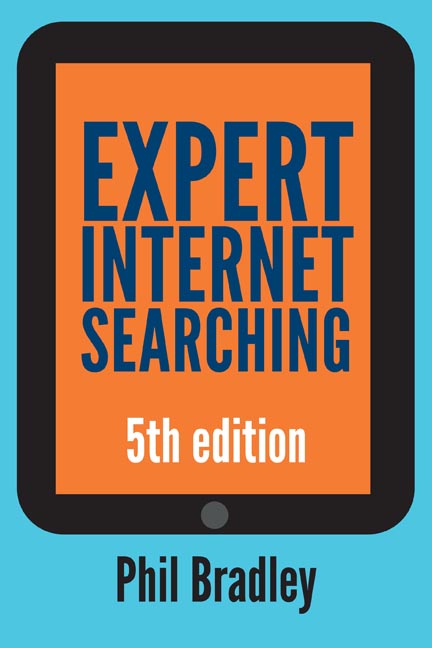Book contents
- Frontmatter
- Contents
- List of figures
- Preface
- Acknowledgements
- 1 An introduction to the internet
- 2 An introduction to search engines
- 3 The world according to Google
- 4 Other free-text search engines
- 5 Directory, clustering and similarity search engines
- 6 Multi- and meta-search engines
- 7 Social media search engines
- 8 Visual and image search engines
- 9 People-based resources
- 10 News-based search engines
- 11 Multimedia search engines
- 12 Specialised search engines
- 13 Hints, tips and the future
- Index
2 - An introduction to search engines
Published online by Cambridge University Press: 09 June 2018
- Frontmatter
- Contents
- List of figures
- Preface
- Acknowledgements
- 1 An introduction to the internet
- 2 An introduction to search engines
- 3 The world according to Google
- 4 Other free-text search engines
- 5 Directory, clustering and similarity search engines
- 6 Multi- and meta-search engines
- 7 Social media search engines
- 8 Visual and image search engines
- 9 People-based resources
- 10 News-based search engines
- 11 Multimedia search engines
- 12 Specialised search engines
- 13 Hints, tips and the future
- Index
Summary
Introduction
I'll start this chapter by asking you a question: ‘How many search engines do you think that there are on the internet?’ The chances are fairly high (and I know this, because I ask this question a lot) that your immediate reaction will be to provide a figure in the region of perhaps ten or a dozen. If you're wildly optimistic, you might reach for several hundred, or even a thousand. In actual fact, no one has any idea as to how many search engines are available, and there are a few reasons for this. First, there's no central database of them, so we can't get a definitive number. Secondly, as we saw in the previous chapter, the market is very volatile, with engines disappearing and others appearing on a regular basis. Thirdly, it depends on your definition of a search engine, and I'll come to that in a moment. However, that doesn't help us reach any sort of answer at all. I used to keep a listing of country-based search engines, but when it reached 5000 it was simply too much work to keep up to date. I ran several searches to see if I could track down any sort of figure but found very little. I ran searches for ‘400,000 search engines’ and was able to increase this to ‘600,000’, mainly from sites offering to submit your website to that number of engines. I also ran a search for the phrase ‘use our search engine’ and had over 800,000 results. None of these are figures that I'm prepared to trust, but I've always gone with a figure that suggests up to about 400,000 of them, and no one has contradicted me yet, so that's a figure that I'm going with, but remember, that's little more than a shot in the dark!
Did you know?
The very first search engine was called ‘Archie’, which hosted a collection of directory listings, and began as a university project in 1987 (https://en.wikipedia.org/wiki/Archie_search_engine).
- Type
- Chapter
- Information
- Expert Internet Searching , pp. 21 - 36Publisher: FacetPrint publication year: 2017

